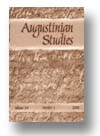
Augustinian Studies
Scope & Guideline
Advancing Scholarly Discourse on Augustinian Philosophy
Introduction
Aims and Scopes
- Theological Exploration:
The journal places a strong emphasis on Augustine's theological contributions, addressing topics such as resurrection, salvation, and liturgical spirituality. - Historical Contextualization:
Papers often contextualize Augustine's thought within historical frameworks, examining his influence on early Christian writings, theological controversies, and ecclesial developments. - Philosophical Engagement:
The journal engages with philosophical themes in Augustine's work, including discussions on free will, moral motivation, and the relationship between faith and reason. - Hermeneutical Approaches:
A significant focus on hermeneutics is evident, with analysis of Augustine's interpretative strategies and their implications for contemporary theological discourse. - Contemporary Relevance:
Augustinian Studies seeks to connect Augustine's insights with contemporary social, ethical, and political issues, making his ancient thought relevant for modern discussions.
Trending and Emerging
- Social Issues and Ethics:
There is a growing trend of exploring Augustine’s thought in relation to contemporary social issues, such as justice, ethics, and moral dilemmas, highlighting his relevance in current societal debates. - Resurrection and Eschatology:
Themes related to resurrection and eschatology are increasingly prominent, suggesting a renewed interest in Augustine’s theological perspectives on life after death and human existence. - Interdisciplinary Approaches:
The journal is seeing more interdisciplinary studies that integrate Augustine's thought with other fields such as psychology, sociology, and political theory, reflecting a broader engagement with his ideas. - Personal Narratives and Confessions:
Emerging scholarship is also focusing on Augustine’s personal narratives, particularly his 'Confessions', as a lens to explore identity, conversion, and human experience, indicating a shift towards more experiential and psychological analyses.
Declining or Waning
- Classical Rhetoric:
Although classical rhetoric was once a prominent theme in the study of Augustine, recent publications show a decreasing focus on this area, possibly overshadowed by more contemporary theological and ethical discussions. - Medieval Philosophy:
There is a noticeable reduction in papers addressing Augustine's influence on medieval philosophy, suggesting a shift away from historical philosophical analysis towards more modern interpretations. - Ecclesial Politics:
Discussions specifically centered on ecclesial politics and Augustine’s role in them appear less frequently, indicating a waning interest in this aspect of his thought compared to other theological themes.
Similar Journals
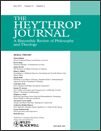
HEYTHROP JOURNAL
Navigating the Rich Tapestry of Human ThoughtHeythrop Journal, published by Wiley, is a distinguished academic periodical that serves as a critical forum for interdisciplinary dialogue spanning multiple fields including philosophy, religious studies, and the sciences. With an impact factor that reflects its growing influence, the journal has successfully engaged scholars since its inception in 1960. The journal is categorized under several quartiles in 2023, notably achieving Q3 rankings in Philosophy and Religious Studies, emphasizing its role in advancing scholarly discourse. The scope of the Heythrop Journal encompasses thoughtful analysis, theological reflection, and interdisciplinary research, appealing not only to researchers and professionals but also to students eager to explore the complex intersections of faith, reason, and contemporary issues. While the journal currently does not offer open access, it continues to maintain a reputation for rigor and relevance within its diverse fields of inquiry. Whether you’re in the realm of neurology or examining waste management sciences, the Heythrop Journal remains a pivotal resource, fostering an enriching environment for intellectual exchange and exploration.
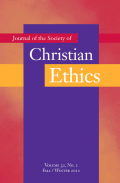
JOURNAL OF THE SOCIETY OF CHRISTIAN ETHICS
Cultivating Understanding of Christian Moral PrinciplesJOURNAL OF THE SOCIETY OF CHRISTIAN ETHICS, published by the Society of Christian Ethics, is a prominent peer-reviewed journal dedicated to the scholarly exploration of ethical issues within Christian traditions. With a rich history since its inception in 2002, this journal has established itself as a significant resource for researchers and practitioners in the fields of Philosophy and Religious Studies, reflected in its Q3 quartile rankings and respectable Scopus ratings. Based in the United States, and affiliated with St. John's University, the journal seeks to advance dialogue on complex moral dilemmas encountered in contemporary society through the lens of Christian ethics. Although not an Open Access journal, its compelling contributions and insightful articles are invaluable for students, academics, and professionals aiming to deepen their understanding of ethical discourse. As it converges through the years up until 2024, the Journal of the Society of Christian Ethics remains a vital platform for interdisciplinary engagement and ethical scholarship.
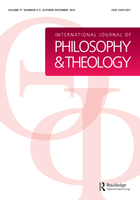
International Journal of Philosophy and Theology
Bridging the Gap Between Reason and BeliefThe International Journal of Philosophy and Theology, published by ROUTLEDGE JOURNALS, TAYLOR & FRANCIS LTD, serves as a vital platform for scholarly dialogue at the intersection of philosophical inquiry and theological exploration. With the ISSN 2169-2327 and E-ISSN 2169-2335, this journal aims to advance critical discussions and promote interdisciplinary research, fostering engagement among researchers, professionals, and students alike. Over its publishing span from 2013 to 2024, the journal has made significant strides, achieving a category quartile ranking of Q3 in both Philosophy and Religious Studies for 2023. With a growing impact in the fields of Arts and Humanities, reflected in its Scopus ranks—Rank #357/644 for Religious Studies and Rank #498/806 for Philosophy—the journal is uniquely positioned to influence contemporary debates and foster greater understanding of complex theological and philosophical concepts. Although the journal does not currently operate under an open access model, it remains an essential resource for those interested in deepening their understanding of these critical disciplines, and it continues to uphold its commitment to rigorous scholarship.
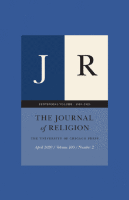
JOURNAL OF RELIGION
Uncovering the Dynamics of Faith Across CulturesJOURNAL OF RELIGION, published by University of Chicago Press, stands as a prominent scholarly platform in the field of religious studies. With an ISSN of 0022-4189 and an E-ISSN of 1549-6538, this journal has been serving the academic community since its inception in 1982, providing a crucial forum for innovative research and critical analysis of various religious phenomena. The journal's placement in the Q3 category for Religious Studies and its ranking in the 66th percentile among peers underscore its impact within the academic landscape, making it a valuable resource for researchers and professionals alike. Although it does not offer open access, the journal remains committed to advancing knowledge in the discipline, targeting a diverse audience from students to established scholars. With upcoming issues extending to 2024, JOURNAL OF RELIGION continues to foster interdisciplinary dialogue and contribute to the understanding of religion in contemporary society.
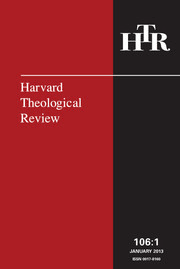
HARVARD THEOLOGICAL REVIEW
Exploring the Depths of Theological InquiryHARVARD THEOLOGICAL REVIEW is a prestigious academic journal that has been a cornerstone of the field of religious studies since its inception in 1908. Published by Cambridge University Press, this journal holds a significant position in scholarly discourse, boasting a 2023 Scopus ranking of #181 out of 644 in the Arts and Humanities category and a commendable Q2 quartile status. With a focus on theological inquiry, the journal serves as a vital platform for both historical and contemporary studies in religion, making it an essential resource for researchers, professionals, and students alike. The HARVARD THEOLOGICAL REVIEW publishes a diverse array of articles, reviews, and essays that contribute to the critical understanding of theological concepts and the interplay of religion in society. Although it does not provide open access options, the journal remains robust in its contributions, fostering a rich dialogue in the field well into 2024 and beyond.
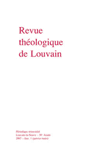
REVUE THEOLOGIQUE DE LOUVAIN
Connecting tradition and contemporary issues in theology.REVUE THEOLOGIQUE DE LOUVAIN, published by PEETERS, stands as an important academic journal in the field of Religious Studies, specifically focusing on theological discourse and its implications in contemporary society. With its ISSN 0080-2654 and E-ISSN 1783-8401, this journal has been active since 1996 and continues to contribute significantly to the academic landscape, particularly within Belgium and beyond. The journal is currently ranked in the Q3 category among its peers, positioned at rank #518 out of 644 in the Scopus database, indicating its relevance within a competitive field. Although it does not offer open access, its rigorous peer-review process ensures the publication of high-quality research that advances scholarly dialogue. The REVUE THEOLOGIQUE DE LOUVAIN aims to promote critical reflection on theological issues, foster interdisciplinary research, and engage with contemporary religious challenges. Researchers, professionals, and students alike will find this journal an invaluable resource for deepening their understanding of theology and its societal impacts.
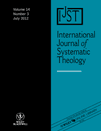
International Journal of Systematic Theology
Fostering scholarly engagement in the heart of religious studies.International Journal of Systematic Theology is an esteemed publication dedicated to advancing the discourse in the field of religious studies, primarily through rigorous theological analysis and scholarly engagement. Published by WILEY in the United Kingdom, this journal has established itself as a significant contributor to the academic landscape since its inception in 1999. With a commendable Scopus ranking in the 54th percentile within its category and designated as Q2 in the 2023 quartiles, it provides a platform for cutting-edge research that explores systematic theology's methodologies, theories, and applications. While it does not currently offer open access, the journal remains accessible to a wide readership of researchers, professionals, and students striving to deepen their understanding of theology and its implications in contemporary contexts. Located at 111 River St, Hoboken, NJ, the journal continues to foster an intricate dialogue among scholars and practitioners in the field, ensuring its relevancy and impact in shaping theological scholarship through to 2024 and beyond.
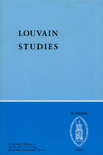
Louvain Studies
Advancing Scholarly Discourse Since 1977Louvain Studies is a distinguished academic journal published by PEETERS, specializing in the nuanced fields of Philosophy and Religious Studies. Established in 1977, the journal serves as a critical platform for scholarly discourse, contributing to the understanding and analysis of philosophical and theological concepts through its rigorous peer-reviewed articles. With an ISSN of 0024-6964 and an E-ISSN of 1783-161X, the journal is based in Leuven, Belgium, providing a unique European perspective on an array of interdisciplinary studies. Although not openly accessible, it remains a vital resource for researchers and students, boasting rankings within the 30th percentile for Religious Studies and 26th percentile for Philosophy in the Scopus database. The journal’s commitment to academic excellence is evident in its quartile rankings, placing it among the noteworthy publications in these fields. Louvain Studies fosters dialogue, challenges conventional thought, and encourages innovative research, making it an essential reference for anyone invested in the philosophical and religious discourse.
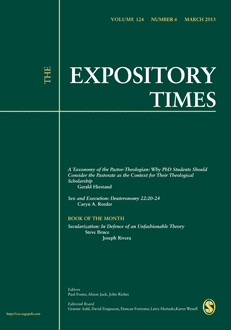
EXPOSITORY TIMES
Bridging Tradition and Modernity in TheologyEXPOSITORY TIMES is a prestigious journal published by SAGE Publications Ltd that has been a cornerstone in the field of Religious Studies since its inception in 1889. With a strong emphasis on the analysis and interpretation of biblical texts, this journal fosters critical discourse among researchers, scholars, and theologians, contributing significantly to ongoing debates and advancements in religious scholarship. The journal has an impressive scope, seeking to bridge traditional and contemporary perspectives, which is further underscored by its placement in the 2023 Category Quartiles as Q3 in Religious Studies. Although not an open-access publication, it maintains a reputable presence, evidenced by its Scopus Ranking of rank #364 out of 644, placing it in the 43rd percentile within its category. The journal's commitment to rigorous scholarship and its invitation to explore diverse theological viewpoints make it an essential resource for those invested in the study of religion and its impact on society.

REVELETEO-Revista Electronica Espaco Teologico
Illuminating Diverse Perspectives in Religious StudiesREVELETEO - Revista Eletrônica Espaço Teológico is a premier academic journal dedicated to the exploration and dissemination of theological knowledge, published by the Pontifícia Universidade Católica de São Paulo, Faculdade de Teologia. With an esteemed ISSN of 2177-952X, this journal serves as a vital platform for researchers, scholars, and students interested in the multifaceted dimensions of theology and religious studies. Although currently operating with traditional access options, REVELETEO is committed to enhancing the visibility and reach of theological discourse. This journal focuses on a diverse range of topics within the field, inviting critical examinations and innovative perspectives that contribute to the understanding of contemporary theological issues. Its academic rigor and dedication to quality scholarship make it a respected resource for advancing theological research in Brazil and beyond. With an emphasis on fostering academic dialogue, REVELETEO aims to engage its readership in meaningful discourse that bridges tradition with modern challenges in the sphere of religion and spirituality.